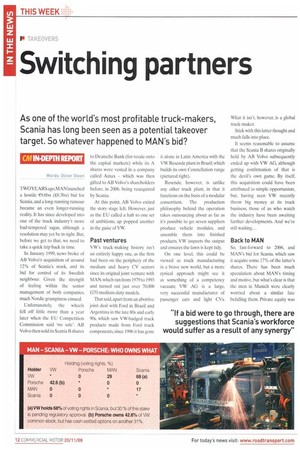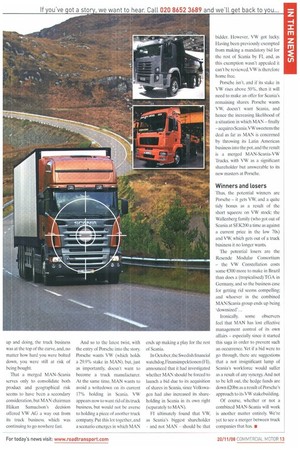Switching partners
Page 12

Page 13

If you've noticed an error in this article please click here to report it so we can fix it.
As one of the world's most profitable truck-makers, Scania has long been seen as a potential takeover target. So whatever happened to MAN's bid?
CM IN-DEFIli REPORT
Words: Oliver Dixon TWO YEARS ago, MAN launched a hostile €9.6bn (£8.3bn) bid for Scania, and a long-running rumour became an even longer-running reality. It has since developed into one of the truck industry's more bad-tempered sagas, although a resolution may yet be in sight. But, before we get to that, we need to take a quick trip back in time.
In January 1999, news broke of AB Volvo's acquisition of around 12% of Scania's stock, and its bid for control of its Swedish neighbour. Given the strength of feeling within the senior management of both companies, much Nordic grumpiness ensued.
Unfortunately, the wheels fell off little more than a year later when the EU Competition Commission said no sale'. AB Volvo then sold its Scania B shares to Deutsche Bank (for resale onto the capital markets) while its A shares were vested in a company called Ainax — which was then gifted to AB Volvo's shareholders before. in 2006, being reacquired by Scania.
At this point, AB Volvo exited the story stage left. However, just as the EU called a halt to one set of ambitions, up popped another in the guise of VW.
Past ventures
VW's truck-making history isn't an entirely happy one, as the firm had been on the periphery of the medium and heavy CV sectors since its original joint venture with MAN, which ran from 1979 to 1993 and turned out just over 70,000 G70 medium-duty models That said, apart from an abortive joint deal with Ford in Brazil and Argentina in the late 80s and early 90s, which saw VW-badged truck products made from Ford truck components, since 1996 it has gone it alone in Latin America with the VW Resende plant in Brazil, which builds its own Constellation range (pictured right).
Resende. however, is unlike any other truck plant, in that it functions on the basis of a modular consortium. The production philosophy behind the operation takes outsourcing about as far as it's possible to go: seven suppliers produce vehicle modules, and assemble them into finished products. VW inspects the output and ensures the lawn is kept tidy.
On one level, this could be viewed as truck manufacturing in a brave new world, but a more cynical approach might sec it as something of a competency vacuum; VW AG is a large, very successful manufacturer of passenger cars and light CVs. What it isn't, however, is a global truck-maker.
Stick with this latter thought and much falls into place.
It seems reasonable to assume that the Scania B shares originally held by AB Volvo subsequently ended up with VW AG, although getting confirmation of that is the devil's own game. By itself, this acquisition could have been attributed to simple opportunism, but, having seen VW recently throw big money at its truck business, those of us who watch the industry have been awaiting further developments. And we're still waiting...
Back to MAN
So, fast-forward to 2006, and MAN's bid for Scania, which saw it acquire some 17% of the latter's shares. There has been much speculation about MAN's timing and motive, but what's clear is that the men in Munich were clearly worried about a similar fate befalling them. Private equity was up and doing, the truck business was at the top of the curve, and, no matter how hard you were bolted down, you were still at risk of being bought.
That a merged MAN-Scania serves only to consolidate both product and geographical risk seems to have been a secondary consideration, but MAN chairman Hakan Samuelson's decision offered VW AG a way out from its truck business, which was continuing to go nowhere fast. And so to the latest twist, with the entry of Porsche into the story. Porsche wants VW (which holds a 29.9% stake in MAN), but, just as importantly, doesn't want to become a truck manufacturer. At the same time, MAN wants to avoid a writedown on its current 17% holding in Scania. VW appears now to want rid of its truck business, but would not be averse to holding a piece of another truck company. Put this lot together, and a scenario emerges in which MAN ends up making a play for the rest of Scania.
In October, the Swedish financial watchdog,Fmansinspektionen (PI), announced that it had investigated whether MAN should be forced to launch a bid due to its acquisition of shares in Scania, since Volkswagen had also increased its shareholding in Scania in its own right (separately to MAN).
FI ultimately found that VW, as Scania's biggest shareholder and not MAN should be that bidder. However, VW got lucky. Having been previously exempted from making a mandatory bid for the rest of Scania by PI, and, as this exemption wasn't appealed it can't be reviewed. VW is therefore home free.
Porsche isn't, and if its stake in VW rises above 50%, then it will need to make an offer for Scania's remaining shares. Porsche wants VW, doesn't want Scania, and hence the increasing likelihood of a situation in which MAN finally -acquires Scania. VW sweetens the deal as far as MAN is concerned by throwing its Latin American business into the pot, and the result is a merged MAN-Scania-VW Trucks, with VW as a significant shareholder but answerable to its new masters at Porsche.
Winners and Losers
Thus, the potential winners are Porsche it gets VW, and a quite tidy bonus as a result of the short squeeze on VW stock; the Wallenberg family (who got out of Scania at SEK200 a time as against a current price in the low 70s) and VW which gets out of a truck business it no longer wants.
The potential losers are the Resende Modular Consortium the VW Constellation costs some €.300 more to make in Brazil than does a (tropicalised) TGA in Germany, and so the business case for getting rid seems compelling; and whoever in the combined MAN/Scania group ends up being 'downsized'...
Ironically, some observers feel that MAN has lost effective management control of its own affairs especially since it started this saga in order to prevent such an occurrence. Yet if a bid were to go through, there arc suggestions that a not insignificant lump of Scania's workforce would suffer as a result of any synergy. And not to be left out, the hedge funds are down £20bn as a result of Porsche's approach to its VW stakebuilding.
Of course, whether or not a combined MAN-Scania will work is another matter entirely We're yet to see a merger between truck companies that has. •




























































































































































